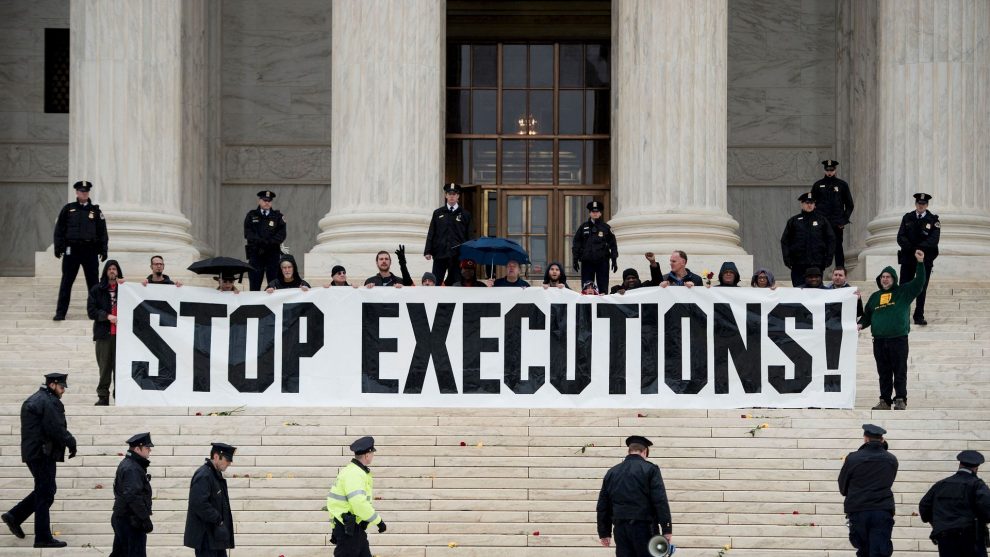Pointed divisions within the Supreme Court over capital punishment reemerged Monday, as the justices issued new opinions rehashing recent last-minute death penalty appeals.
The Court has barely concealed its sharp internal disagreement over late-arriving death penalty cases in recent months.
One such dispute arose in Alabama, where inmate Christopher Lee Price asked to be put to death with nitrogen hypoxia, as opposed to a lethal injection protocol. Price asked the high court to stop his execution on April 11. The Court denied Price’s application, over a seething dissent from Justice Stephen Breyer.
Thomas wrote a separate opinion to “set the record straight” Monday, hitting notes frequently sounded by the conservative justices in recent death penalty cases.
“[Price’s] strategy is no secret, for it is the same strategy adopted by many death-row inmates with an impending execution: bring last-minute claims that will delay the execution, no matter how groundless,” Thomas wrote. “The proper response to this maneuvering is to deny meritless requests expeditiously.”
The justices were scheduled to meet in private conference on April 12 to review pending petitions. Breyer proposed holding Price’s case over for discussion at that meeting in his dissent. In a biting rejoinder, Thomas dismissed that notion out of hand, saying Breyer’s plan was so unconvincing it might not have been an earnest idea.
Mamdani’s response to Trump’s Iran strike sparks conservative backlash: ‘Rooting for the ayatollah’
Iran vows ‘decisive’ self-defense at UN after Trump kills supreme leader in Operation Epic Fury
Concerns rise over DHS shutdown in shadow of Iran strikes: ‘Now would be a good time’ to end it
Jeb Bush commends former rival Trump’s Iran operation: ‘This is their time to take their country back’
Man confesses to killing 7-year-old while on the lam after DNA links him to 30-year cold case: authorities
Obama official who backed Iran deal sparks online outrage with reaction to Trump’s strike: ‘Sit this one out’
Bill Clinton’s credibility threatened by decades of scandals amid grilling over Epstein ties
Trump says Khamenei is dead: ‘The single greatest chance for the Iranian people to take back their Country’
Monitoring the situation: White House releases photos of Trump, Rubio and team being briefed on Iran operation
Iran Supreme Leader Targeted, Believed Killed, in Sweeping US-Israeli Strikes
The US and Israel attacked Iran: What we know
Trump finds unlikely Democratic allies on decision to strike Iran
Democrats buck party leaders to defend Trump’s ‘decisive action’ on Iran
Nancy Guthrie missing: Forensic scientist encourages new investigative approach since case ‘isn’t cold yet’
FBI raises counterterror teams to high alert amid Iran tensions
“Insofar as Justice Breyer was serious in suggesting that the Court simply ‘take no action’ on the state’s emergency motion to vacate until the following day it should be obvious that emergency applications ordinarily cannot be scheduled for discussion at weekly (or sometimes more infrequent) conferences,” Thomas wrote.
Ultimately Price’s execution did not proceed. The state’s death warrant expired at midnight on April 11, and the Court’s decision on his stay application did not issue until the small hours on April 12 because of Breyer’s dissent.
The justices also returned to a March 28 death penalty dispute involving a Texas inmate denied access to his preferred religious adviser in the death chamber. The inmate, Patrick Henry Murphy, is a practicing Buddhist. Though Christian and Muslim clerics are allowed in the execution chamber, Murphy’s Buddhist chaplain was not permitted entry under state policy.
Murphy claimed that policy violates the Constitution, as well as a federal law called the Religious Land Use and Institutionalized Persons Act (RLUIPA). The Supreme Court stayed Murphy’s execution so he could pursue those claims. The decision was somewhat strange, since the Court allowed Alabama to execute a Muslim prisoner named Domineque Hakim Marcelle Ray just weeks earlier on a 5-4 vote in a case presenting similar facts.
Justice Samuel Alito dissented in the Murphy case, but in an unusual move published an opinion on Monday, six weeks after the stay application was granted. Alito said he wrote separately because “late stay applications present a recurring and important problem and because religious liberty claims like Murphy’s may come before the Court in future cases.” Thomas and Justice Neil Gorsuch joined the dissent.
Mamdani’s response to Trump’s Iran strike sparks conservative backlash: ‘Rooting for the ayatollah’
Iran vows ‘decisive’ self-defense at UN after Trump kills supreme leader in Operation Epic Fury
Concerns rise over DHS shutdown in shadow of Iran strikes: ‘Now would be a good time’ to end it
Jeb Bush commends former rival Trump’s Iran operation: ‘This is their time to take their country back’
Man confesses to killing 7-year-old while on the lam after DNA links him to 30-year cold case: authorities
Obama official who backed Iran deal sparks online outrage with reaction to Trump’s strike: ‘Sit this one out’
Bill Clinton’s credibility threatened by decades of scandals amid grilling over Epstein ties
Trump says Khamenei is dead: ‘The single greatest chance for the Iranian people to take back their Country’
Monitoring the situation: White House releases photos of Trump, Rubio and team being briefed on Iran operation
Iran Supreme Leader Targeted, Believed Killed, in Sweeping US-Israeli Strikes
The US and Israel attacked Iran: What we know
Trump finds unlikely Democratic allies on decision to strike Iran
Democrats buck party leaders to defend Trump’s ‘decisive action’ on Iran
Nancy Guthrie missing: Forensic scientist encourages new investigative approach since case ‘isn’t cold yet’
FBI raises counterterror teams to high alert amid Iran tensions
Alito agreed that the questions Murphy and Ray raised “are important and may ultimately be held to have merit.” Still, he cautioned that death row inmates and their attorneys must litigate in a timely manner, instead of reserving claims for the last minute in a bid to delay executions.
In Murphy’s case, Alito noted that the Texas policy at issue has been in place since 2013. What’s more, Murphy was informed that his Buddhist chaplain would be denied access to the death chamber on March 5, but his attorneys waited until March 26, two days before the execution, to sue in federal court.
“If the tactics of Murphy’s attorneys in this case are not inexcusably dilatory, it is hard to know what the concept means,” Alito wrote.
The Alito opinion prompted a short rebuttal from Justice Brett Kavanaugh, who voted to grant Murphy a stay. Chief Justice John Roberts joined Kavanaugh’s opinion.
Kavanaugh pointed out that Texas amended its policy within five days of the Court’s decision in Murphy’s case. Religious advisers now observe executions from an adjacent viewing room, and are categorically excluded from the death chamber. Because Texas changed its protocol so quickly, Kavanaugh said it was clear Murphy raised the issue in a timely manner, since Murphy asked prison officials about his chaplain’s access a full month before the execution date.
“This Court’s stay facilitated the prompt resolution of a significant religious equality problem with the state’s execution protocol and should alleviate any future litigation delays or disruptions that otherwise might have occurred as a result of the state’s prior discriminatory policy,” Kavanaugh wrote.
While Kavanaugh believed Murphy’s case warranted relief, he joined Alito in emphasizing that the courts should not allow death row inmates to engage in 11th hour gamesmanship.
Mamdani’s response to Trump’s Iran strike sparks conservative backlash: ‘Rooting for the ayatollah’
Iran vows ‘decisive’ self-defense at UN after Trump kills supreme leader in Operation Epic Fury
Concerns rise over DHS shutdown in shadow of Iran strikes: ‘Now would be a good time’ to end it
Jeb Bush commends former rival Trump’s Iran operation: ‘This is their time to take their country back’
Man confesses to killing 7-year-old while on the lam after DNA links him to 30-year cold case: authorities
Obama official who backed Iran deal sparks online outrage with reaction to Trump’s strike: ‘Sit this one out’
Bill Clinton’s credibility threatened by decades of scandals amid grilling over Epstein ties
Trump says Khamenei is dead: ‘The single greatest chance for the Iranian people to take back their Country’
Monitoring the situation: White House releases photos of Trump, Rubio and team being briefed on Iran operation
Iran Supreme Leader Targeted, Believed Killed, in Sweeping US-Israeli Strikes
The US and Israel attacked Iran: What we know
Trump finds unlikely Democratic allies on decision to strike Iran
Democrats buck party leaders to defend Trump’s ‘decisive action’ on Iran
Nancy Guthrie missing: Forensic scientist encourages new investigative approach since case ‘isn’t cold yet’
FBI raises counterterror teams to high alert amid Iran tensions
“I fully agree with Justice Alito that counsel for inmates facing execution would be well advised to raise any potentially meritorious claims in a timely manner, as this Court has repeatedly emphasized,” Kavanaugh wrote.
Whatever divisions emerged among the high court’s conservatives in the Murphy dispute, all five were united in an April death penalty decision which suggested a reorientation in the Court’s approach to capital punishment.
Story cited here.
























